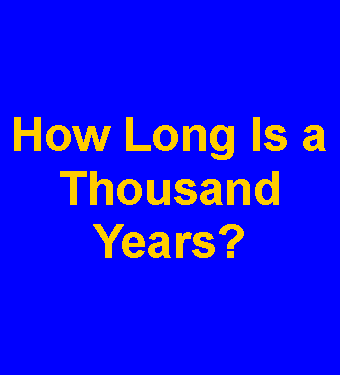

|
This question is not as foolish as it may seem. Historically it would take us back prior to the time William the Conqueror invaded Britain. The discovery of America is barely 500 years ago. Millennialists tell us that Christ is coming back to establish His throne in Jerusalem and reign over this world for 1000 years.
The basis for this belief rests chiefly on about seven verses of Scripture in the twentieth chapter of Revelation. Now, if the Bible does teach this, then it will come to pass. Unfortunately, not everyone interprets this portion of Scripture in the same manner.
But let us read what the Bible says: “And I saw an angel come down from heaven, having the key to the bottomless pit and a great chain in his hand. And he laid hold on the Dragon, that old Serpent, which is called the Devil and Satan, and bound him a thousand years. And cast him into the bottomless pit, and shut him up, and set a seal upon him, that he should deceive the nations no more, till the thousand years should be fulfilled; and after that he must be loosed a little season. And I saw thrones, and they sat on them, and judgment was given unto them: and I saw the souls of them that were beheaded for the witness of Jesus, and for the word of God, and which had not worshipped the beast, neither his image, neither had received his mark upon their foreheads, or in their hands, and they lived and reigned with Christ a thousand years. But the rest of the dead lived not again until the thousand years were finished. This is the first resurrection. Blessed and holy is he that hath part in the first resurrection: on such the second death hath no power, but they shall be priests of God and of Christ, and shall reign with Him a thousand years. And when the thousand years are expired, Satan shall be loosed out of his place,” Revelation 20:1-7.
To suggest that this passage of scripture can have a figurative meaning is to risk being accused of not believing the Bible. Yet, when a literal interpretation is considered, we discover hundreds of different conflicting views on the details. Many give up and just accept what the most convincing minister says. The most prevalent theory is that Christ will reign in Jerusalem and that the Jews will be pre-eminent under His rule. All seem to agree that a holocaust Armageddon will take place at the end.
Millennial literalists themselves are by no means agreed. Some are post-tribulation rapturists while others are pre-tribulation rapturists. Some tell us there will be four resurrections and seven judgment scenes. Some tell us there are two gospels, while Scofield and others claim there are four. Most of them tell us that Christ offered two kingdoms, one Jewish and the other universal regeneration.
These are but a few of the confusing teachings we are called upon to sort out and thread our way through a maze of proof texts and so-called authorities on Bible exposition. Being literal is by no means a perfect solution, and above all it should caution us to be careful about any arbitrary or dogmatic conclusion and cause us to humbly seek the aid of the Holy Spirit to guide us aright.
The safest way to discover whether a teaching is a symbol or not is to compare its use in other parts of the Bible. There are many examples where 1000 is used in the Bible. In Psalm 50:10 we read: “For every beast of the forest is mine, and the cattle upon a thousand hills.” To literally confine God’s ownership to the cattle of 1000 hills would destroy its intent. Which thousand hills would they be? What about the arrows mentioned in Psalms 91:7? “A thousand shall fall at thy side and ten thousand at thy right hand . . . .” Does this imply that arrow 1001 might find its target? Does it suggest counting them?
Daniel 7:10 says: “Thousand thousands ministered unto Him, and ten thousand times ten thousand stood before Him . . . .”
Figures like this are meant to convey the idea of a countless multitude. The indefinite span signified by a thousand years is further shown in Psalms 90:4, “For a thousand years in Thy sight are but as yesterday . . . .” And in 2 Peter 3:8 we read: “That one day is with the Lord as a thousand years, and a thousand years as one day.” These quotations should suffice to demonstrate that a thousand years in the Bible does not necessarily limit it to our calendar, which incidentally, did not exist when this prophecy was written.
|

|
At the time of the Reformation the doctrine of the millennium was rejected by the Protestant Churches, but revived in some of the sects, such as the more fanatical Anabaptists, and that of the Fifth Monarch Men. Luther scornfully rejected “the dream” that there would be an earthly kingdom of Christ preceding the day of judgment. The Augsburg Confession condemns those “who now scatter Jewish opinions, that, before the resurrection of the dead, the godly shall occupy the kingdom of the world, the wicked being everywhere suppressed.” Art. XVII. And the Second Helvetic Confession says: “Moreover, we condemn the Jewish dreams, that before the day of judgment there shall be a golden age in the earth, and the godly shall possess the kingdoms of the world, their wicked enemies being trodden underfoot.” Chapter XI.
--Louis Berkhof, The History of Christian Doctrines, p. 263 |